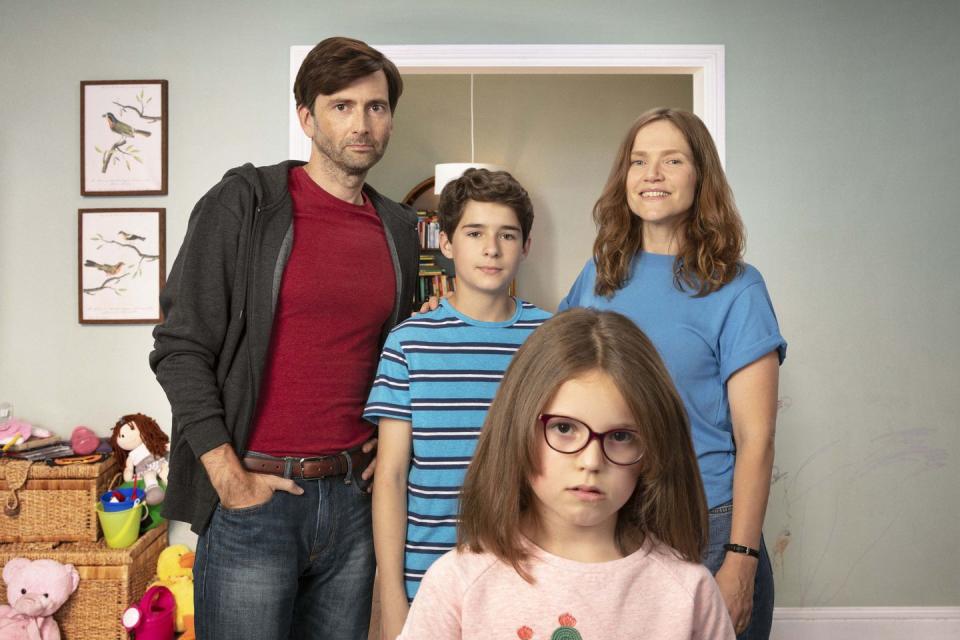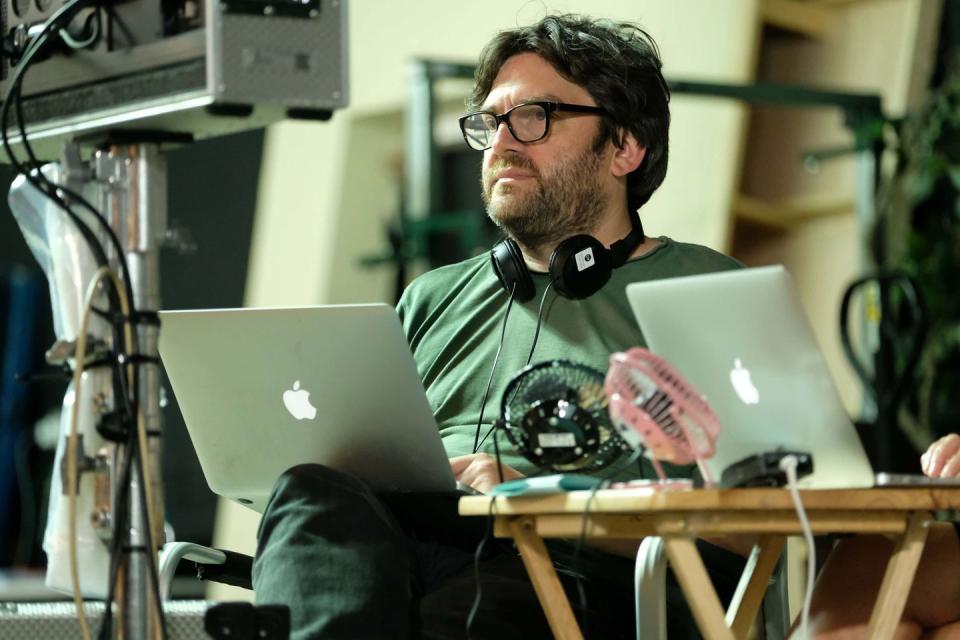There She Goes is so much funnier than it should be

Note: Contains minor spoilers for There She Goes episode one
TV is having a diversity moment. Killing Eve, Black Earth Rising and Butterfly are just a handful of dramas with fresh voices and perspectives occupying prime viewing slots, captivating audiences and stoking the kind of impassioned, colourful debate that showrunners dream of.
The new five-part BBC Four sitcom There She Goes, which lands on our screens tonight, is not to be missed.
The comedy-drama from writer Shaun Pye is about a family unit which 17,000 UK families, or thereabouts, will instantly recognise. David Tennant plays Simon, a magazine staffer, and Jessica Hynes takes on the role of Emily, an academic scientist. The married couple have two children, a boy called Ben (Edan Hayhurst), who enjoys playing football and takes a little longer than his parents would like to do his homework, and Rosie (Miley Locke), who has severe learning difficulties.

Nine-year-old Rosie can't talk, clean her teeth, dress herself, feed herself or do any of the things that many children are able to do with ease. It sounds bleak – and in parts, it is. Make no mistake about that. But this is a comedy, and in the midst of the impossibly difficult moments that are part and parcel of raising a child like Rosie, there are flashes of light in which you find yourself audibly laughing, finding joy in the most unexpected of places.
The two shouldn't go together, but they do.
The narrative is split between two timelines – 2006, when we see a very pregnant Emily and the immediate aftermath of Rosie's birth, and almost a decade on in 2015, when the family have managed to establish their own chaotic rhythm, kind of.
There is a marked difference between the two distinct periods, both in atmosphere and in how they physically look on screen. When we jump back in time, there is very little, if anything, to smile about – Rosie is smaller in size than the average baby, refuses to latch and doesn't smile – something that Emily points out in sharp contrast to the other infants in her baby sing-a-long class. Cast in muted, dingy tones, the atmosphere feels permanently choked.
Emily is constantly on the verge of collapse, while Simon spends as much time as he can sinking pints in the pub, avoiding his responsibilities at home. There is a particularly devastating exchange between the couple when Emily says to her husband: "It's not that I don't want to love her, I just don't think I can."

Fast-forward to 2015 and Rosie can be seen gleefully enjoying a bubble bath. The washed-out tones that characterise the first few months of her life have made way for a brighter palette, and the mood is different.
Life is still extremely challenging – episode one begins with a disastrous trip to the park in which Simon, who can't drive, has to enlist Emily to stuff a screaming Rosie into the car and make the ten-second journey up the road, before calling it a day because their daughter is lying on the grass eating "park matter".
But there is a marked difference – there is a sense of acceptance: this isn't the life they would have chosen, but it's what they've got, so they make the best of it. Emily's attitude to Rosie has performed a complete 180 and we see a mother who isn't simply caring for her child out of duty, as she previously admits, but out of an unshakeable love.
The show itself feels very informed about the realities of bringing up a child like Rosie, which isn't surprising when you find out that Pye himself has a daughter with a rare chromosomal disorder. His daughter, who is now 12 years old, was born with a genetic condition that is so rare it's still undiagnosed. She is unable to talk and has the mental age of a 12 or 18-month-old.
Speaking at the screening of There She Goes, the show creator said that he was encouraged to write it by friends after posting "little stories and things that she's done that made us laugh [or] infuriated us" on Facebook: "People just kept saying: 'This is a perspective that we don't hear – nobody talks about this sort of thing'.
"It's interesting, it's funny at times, it's sad at times, and I'm a comedy writer and I thought, well, possibly we should do something with this. We thought it might make a good comedy-drama."

And he was aided by his wife, who played a big part in making sure that every little detail portrayed what life is really like for families such as theirs:" I wrote a version and then obviously I consulted massively with my wife, and we went through various drafts.
"It's hilarious to read the two versions, because in the early version, it's about this poor bloke who's got this learning disabled daughter and jeez he's got a tough life. And at the end of every scene, he's always got a little bon mot, like James Bond – and we ended up with this, because basically, my wife looked at it and went: 'Are you having a f**king laugh?'."
The fact that this show is driven by people with a warts-and-all perspective and a real insight imbues There She Goes with an authenticity and rawness that an outsider wouldn't be able to achieve. Pye has served up a first-hand account of the reality: it's bloody hard, but that doesn't mean there is nothing to smile about.

Diversity and representation are hot topics at the moment, with a number of production companies and studios making a concerted effort to shake up the established order of heteronormative white men enjoying the lion's share of opportunities.
In the case of There She Goes, Pye and his team chose to listen to expert advice when casting Miley Locke, who isn't disabled, as Rosie: "We had a very extensive auditioning process that included disabled and non-disabled young actors. The reason that we decided to go with Miley is that, after consultation with a lot of psychologists and professionals, we just realised it was too big a thing to ask a young learning-disabled actor to attempt.
"It's a very difficult schedule – you're asking somebody to do 21-22 days, without much of a break, long hours, and we were basically told that was too big a thing to burden a young learning-disabled person with."

Pye has made it clear that There She Goes is a "case study" about his family's life, a "specific story" that doesn't pretend to understand everyone's experience. But there are strands laced throughout this comedy-drama that Hynes is confident will speak to parents who don't have disabled children, and help both groups find some common ground: "We all feel as parents that we're failing, and we look out at other people and think they're doing so brilliantly, and actually I think that most people have these difficult experiences, in one form or another.
"So even though their experiences might not be the same, I think people will be able to relate to it, in some way."
There She Goes could very easily have left viewers feeling an overwhelming sense of pessimism. Rosie's disability isn't a phase – it's a lifelong condition which will require constant round-the-clock support from her parents, and there is wave after wave of obstacles to contend with – Rosie chucks pasta all over the kitchen floor before proceeding to pour a pint of milk over her own head.
Handled differently, this could have become an entirely different story, devoid of any humour or joy. But Pye, through his writing and direction, paired with outstanding performances from both Tennant and Hynes, yanks you back from the edge at just the right moment, stopping the audience from hurtling into complete and utter despair – because if you don't laugh, you'll cry, and never stop.
It's an unsanitised look at what 800,000 children in the UK, along with their families, contend with every day. There She Goes doesn't sugar-coat a single detail and as a result, we have a piece of drama that manages to tackle an immensely demanding subject with heart, humanity and, most importantly, humour.
You can catch There She Goes on Tue 16 October at 10pm on BBC4.
Want up-to-the-minute entertainment news and features? Just hit 'Like' on our Digital Spy Facebook page and 'Follow' on our @digitalspy Twitter account and you're all set.
('You Might Also Like',)

 Yahoo News
Yahoo News 
